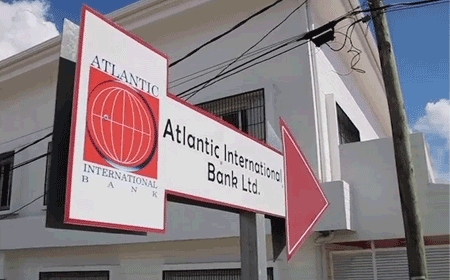BELIZE CITY, Thurs. Sept. 26, 2019– The United States Federal Trade Commission (FTC) had sued Atlantic International Bank Limited and a number of other defendants (AIBL) on behalf of US consumers who lost an estimated 100 million dollars due to investments in the real estate scam that has come to be known as Sanctuary Bay Belize.
On Tuesday, the FTC issued a press release captioned: “Belizean Bank to Pay $23 Million and Cease Operations to Settle FTC Charges It Provided Substantial Assistance to the Sanctuary Belize Real Estate Scam.”
The FTC press release said, “Under a proposed consent order, Belize’s Atlantic International Bank Limited (AIBL) will pay $23 million, representing approximately all of its U.S.-based assets, to settle Federal Trade Commission charges that it assisted various related entities (the Sanctuary Belize Enterprise, or SBE) in deceiving U.S. consumers as part of a scheme to sell property in Sanctuary Belize.”
Sanctuary Belize. which is also known as Sanctuary Bay, is a massive real estate fraud that had bilked US investors out of 100 million dollars on the promise that the investors were paying for retirement homes with various amenities in the southern part of Belize. Most of the promised homes were never built and the AIBL was fingered as a primary facilitator of the fraud.
AIBL and its liquidator have denied that they actively participated in the fraud that scammed over 1,000 consumers.
“The FTC will use the money to provide redress to more than 1,000 consumers injured by the Sanctuary Belize scheme,” said the FTC release. “In November 2018, the Commission announced that it obtained a federal court order temporarily halting the massive real estate scam.”
After a two-week hearing the district court found that the FTC was likely to prevail in its claim against various defendants involved with Sanctuary Belize Enterprise, said the FTC press release.
AIBL representatives visited Sanctuary Belize offices in California and coached its telemarketers about the services AIBL was offering to Americans, the FTC release said.
“Based on this conduct, the amended complaint charges AIBL with participating in deceptive acts or practices in violation of the FTC Act, as well as the agency’s Telemarketing Sales Rule (TSR), by providing ‘substantial assistance or support’ to the Sanctuary Belize scam, while knowing—or consciously avoiding knowing—that SBE was violating the TSR,” the FTC said.
“Notably, AIBL filed multiple unsuccessful motions to dismiss the FTC’s case based on alleged lack of personal jurisdiction because, like many offshore banks that assist and facilitate domestic deceptive practices, AIBL had no offices, employees, or operations within the United States. The FTC responded with evidence that SBE and AIBL jointly marketed both AIBL’s banking services and SBE’s Sanctuary Belize lots to U.S.-based consumers,” the FTC release added.
“The order also imposes a $23 million judgment against AIBL and details how AIBL must transfer the money to the FTC. It explains that the FTC will use the money to provide equitable relief, including consumer redress, to consumers injured by AIBL’s illegal conduct. Finally, the order appoints a receiver to collect the financial judgment from the bank, and assigns to the receiver AIBL’s rights in certain property (also to be used for consumer redress),” said the release.
The FTC ended its release saying, “The Commission vote approving the proposed stipulated final order was 5-0. The FTC filed the proposed order in the U.S. District Court for the District of Maryland, Southern Division. Litigation continues against the remaining defendants.”
The Belize Central Bank-appointed liquidator for AIBL, Julian Murillo, also issued a press release in which he made this statement: “Although there has not been any court judgment or determination against AIBL in the substantive Sanctuary Belize suit, and the bank has strongly denied any wrongdoing, a reasonable settlement of the FTC allegations was in the best interest of AIBL’s depositors and creditors and the liquidation process, for several compelling reasons.”
A reliable source to Amandala, however, has indicated that the AIBL liquidator may have violated one cardinal rule of the liquidation process, if not the laws of Belize, when he agreed to the FTC settlement without first settling with the depositors.
Furthermore, at a press conference in June, the liquidator had announced that 4 million dollars had been spent on legal fees early in the process.
The Belize Central Bank also issued a press release which trumpets the FTC/AIBL settlement.
“The Central Bank of Belize (Central Bank) as regulator for the financial sector acknowledges that the settlement of claims relating to the Sanctuary Belize Enterprise (SBE) (also known as Sanctuary Bay Development) was concluded between the Liquidator for Atlantic International Bank Limited (AIBL) and the United States Federal Trade Commission (FTC). This settlement agreement has been formally approved by the FTC and submitted for the consent of the US District Court for the District of Maryland. This settlement agreement does not involve taxpayer or Central Bank funds and is entirely confined to AIBL’s assets that are in the custody of the Liquidator,” said the release from the Central Bank.
The Central Bank release concludes, “While AIBL does not acknowledge any violation of US law, this SBE settlement agreement enables a timely, more wholesome recovery for AIBL depositors, protects the financial sector from further stress and minimizes economic disruption and risk, all being benefits that are consistent with the Central Bank’s foremost objectives.”

